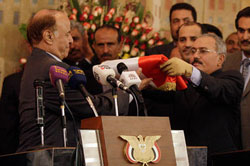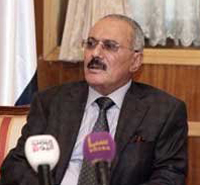redo Jump to...
print Print...
NOTE: Abdrabuh Mansur Hadi was appointed by President Ali Abdullah Saleh as Vice President in 1994. Before his appointment as Vice President, he was briefly the Minister of Defense. Hadi was the sole candidate in the presidential election that was held on February 21, 2012. His candidacy was backed by the ruling party as well as the parliamentary opposition.
(from NYPost.com) SANAA, Yemen — Yemen’s President Ali Abdullah Saleh stepped down Monday after ruling for 33 years during a ceremony at the presidential palace in Sanaa, formally handing power to his deputy, Abdrabuh Mansur Hadi.
“I hand over the banner of the revolution, of the republic, of freedom, of security and of stability … to safe hands,” Saleh said as he stood beside Hadi. He was the fourth [long-term] Arab leader to fall in just over a year.
Yemen’s new president will serve for an interim two-year period as stipulated by a Gulf-brokered power transition plan signed by Saleh last November.
Saleh said that he would “stand … by my brother, the president of the republic” and called on Yemenis to “rally” behind the new leader in his fight against “terrorism, first and foremost, al Qaeda.”
“There is no place for terrorism,” he said.
President Hadi, meanwhile, cautioned that the past year of political turmoil that has crippled the economy and unleashed nationwide insecurity was not over yet and appealed to Yemenis to “cooperate with the new leadership” to help the country emerge from the crisis.
He said he hoped that at the end of his two years in office, Yemen could have a peaceful transition of power.

Yemen's former President Ali Abdullah Saleh (r.) hands over power to the country's newly-elected President Abed Rabbu Mansour Hadi during a ceremony at the presidential palace in Sanaa, Yemen, Monday, Feb. 27.
“I hope we will meet in this room again … to bid farewell and welcome a new leadership,” Hadi said. “I hope that in two years, I will stand in President Ali Abdullah Saleh’s place, and a new president will stand in mine.”
Saleh is the fourth Arab leader to fall since the beginning of the Arab Spring revolutions that forced the resignation of veteran leaders in Tunisia and Egypt, and led to the gruesome death of Libya’s longtime dictator, Moamar Ghadafi.
Hadi took the oath of office in Yemen’s parliament Saturday, and in his first speech as the new leader, he vowed to fight against al Qaeda and restore security across his impoverished nation.
“It is a patriotic and religious duty to continue the battle against al Qaeda,” he said. “If we don’t restore security, the only outcome will be chaos.”
His taking the oath was overshadowed by a suicide bomb attack outside a presidential palace in the country’s southeastern Hadramawt Province, killing 26 elite troops, in an attack military officials said bore the hallmark of al Qaeda.
Yemen’s local al Qaeda branch, the self-proclaimed Partisans of Shariah (Islamic law), has exploited the decline in central government control that accompanied anti-Saleh protests that began last January and eventually forced him to cede [give up; hand over] power.
During the unrest, the militants seized large swaths of southern and eastern Yemen.
Hadi was elected in a Feb. 21 presidential poll in which he received 99.8 percent of the votes cast in an election that saw a 60 percent nationwide turnout.
Reprinted here for educational purposes only. May not be reproduced on other websites without permission from The New York Post.
Questions
BEFORE answering the questions, read the “Background” below the questions, and check out the information under “Resources.”
1. For how many years did Ali Abdullah Saleh rule Yemen?
2. Name the three Arab leaders who were ousted in the past year before Ali Saleh (also name their country and the number of years each ruled).
3. a) Who was elected Yemen’s next president on Feb. 21?
b) How much of the vote did he receive?
c) Why do you think Mr. Hadi received such a large number of votes?
4. What hope did newly elected President Hadi express during the hand-over of power ceremony on Monday?
5. What vow did President Hadi make as he assumed the office of president?
Background
YEMEN AND ALI ABDULLAH SALEH:
- President Ali Abdullah Saleh became the first elected President in reunified Yemen in 1999 (though he had been President of unified Yemen since 1990 and President of North Yemen since 1978).
- Beginning in February and March 2011, an uprising against the government occurred, and clashes with police and pro-government supporters have steadily intensified. Many protestors demand the immediate resignation of the current leadership, and in particular that of President Saleh.
- Yemen is one of the poorest and least developed countries in the Arab World, with an unemployment rate of 35%, dwindling natural resources, a young population and increasing population growth.
- Yemen’s economy is weak compared to most countries in the Middle-East, mainly because Yemen has very small oil reserves.
- Yemen’s economy depends heavily on the oil it produces, and its government receives the vast majority of its revenue from oil taxes. But Yemen’s oil reserves are expected to be depleted by 2017, possibly bringing on economic collapse.
- Yemen does have large proven reserves of natural gas. Yemen’s first liquified natural gas (LNG) plant began production in October 2009.
- Rampant corruption is a prime obstacle to development in the country, limiting local reinvestments and driving away regional and international capital. Foreign investments remain largely concentrated around the nation’s hydrocarbon industry.
(from wikipedia)
Resources
Watch a news report:
- For background on Yemen, go to the U.S. State Department website at state.gov/r/pa/ei/bgn/35836.htm.
- For a map of Yemen and the Middle East, go to worldatlas.com.
- Read about the widespread protests against Ali Abdullah Saleh in January 2011 at:
studentnewsdaily.com/daily-news-article/thousands-of-yemenis-demand-change-in-government - For a timeline of events since protests first began against Saleh in early 2011, go to:
en.wikipedia.org/wiki/Ali_Abdullah_Saleh#Consequences_of_2011-2012_uprising
Daily “Answers” emails are provided for Daily News Articles, Tuesday’s World Events and Friday’s News Quiz.




